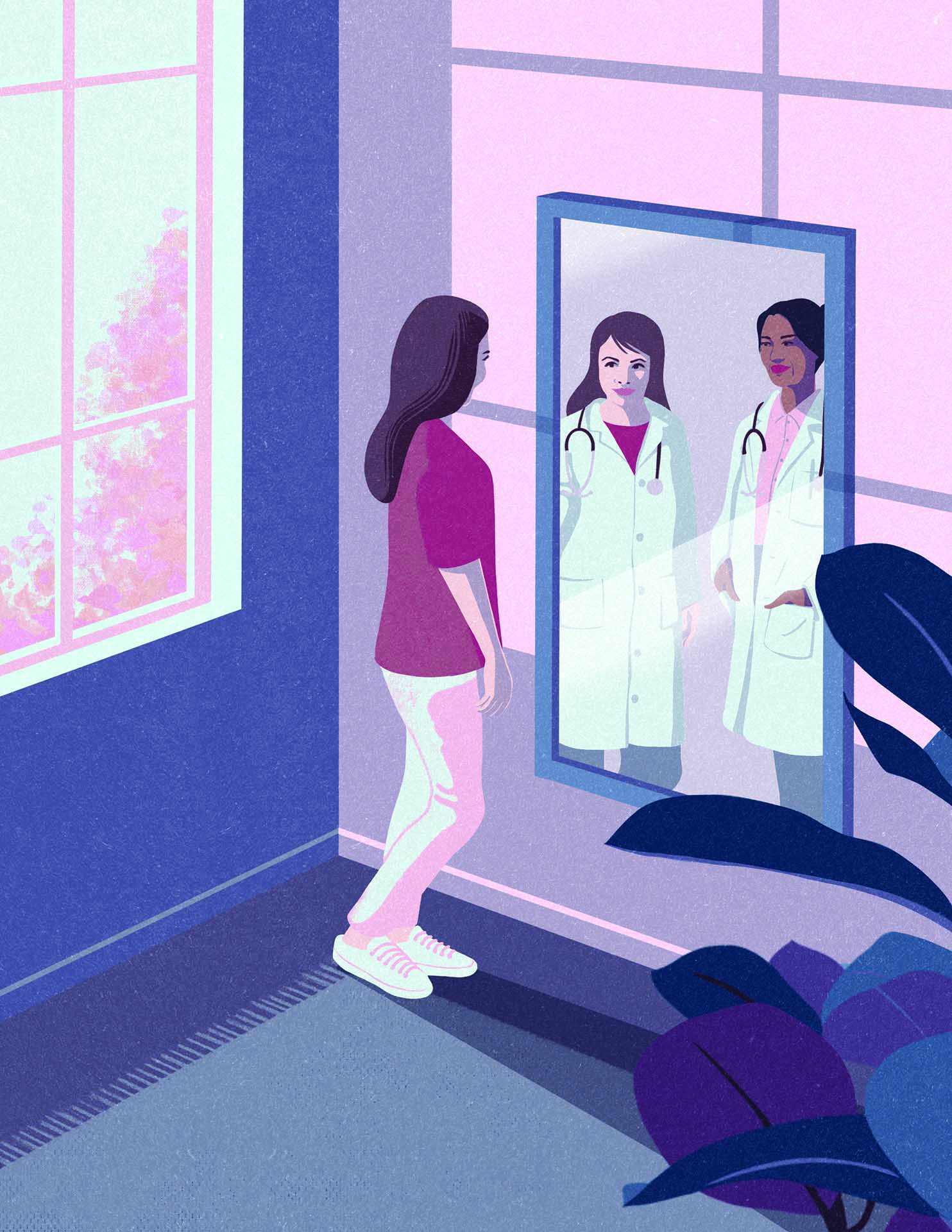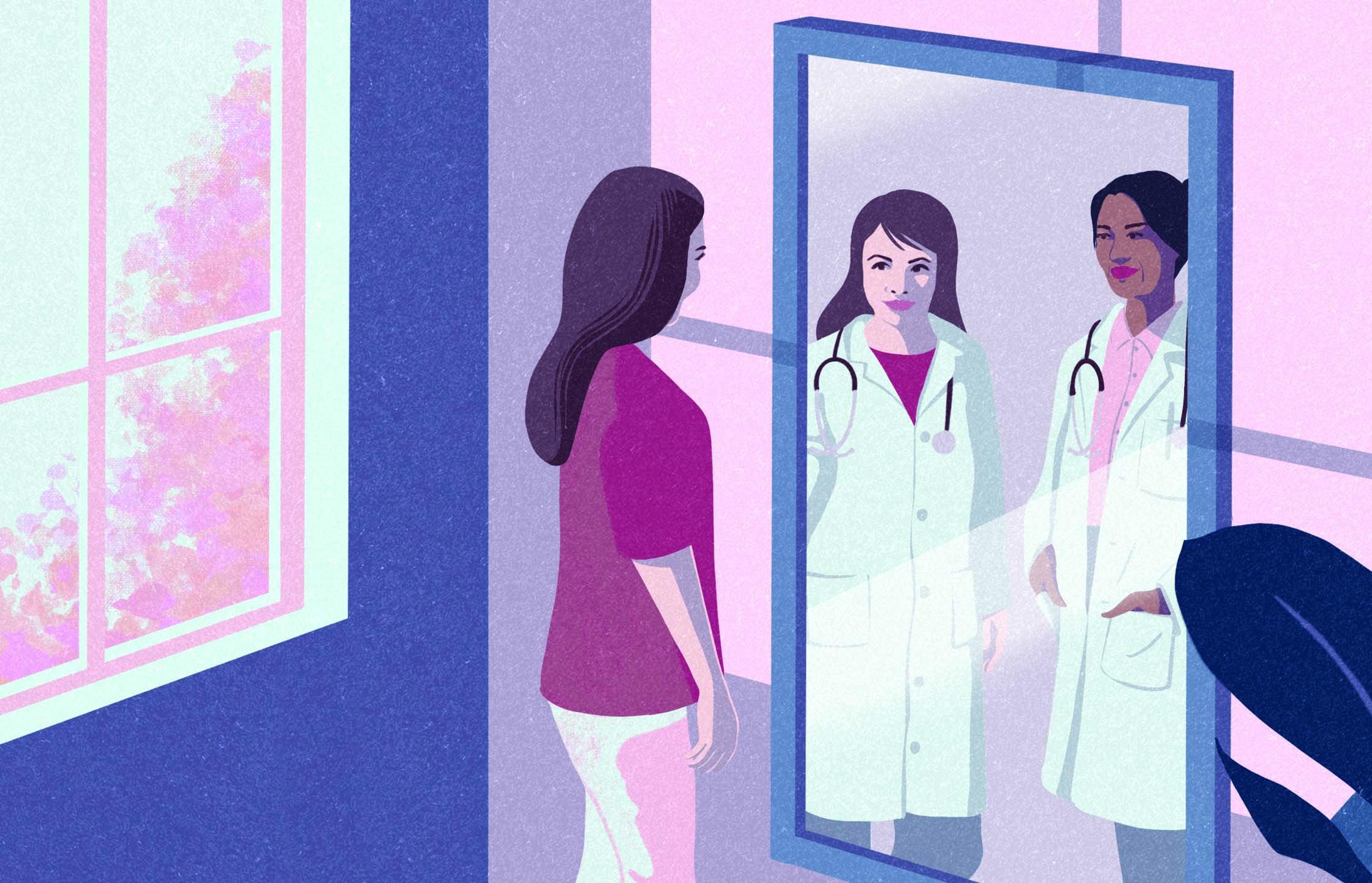Guiding the Way
A new program supports students’ personal growth and professional careers
By Richard Westlund
Illustration by Stefania Infante

L
ike many medical students, Anh Le, currently in her third year in the Miller School’s M.D./M.P.H. program, has excelled in her studies but found public speaking a challenge. She also wanted help narrowing down the many possibilities for her career path after graduating.
Now, Le is looking to the future with confidence, thanks to the guidance, support, and educational opportunities offered through the innovative Longitudinal Clinical Educator program — part of the school’s new NextGenMD curriculum. Since its adoption in 2020, the faculty-led, small peer group LCE concept has received outstanding reviews from students who praise its comprehensive approach that goes well beyond a traditional faculty advisor.
“I have been coached and mentored in ways that have been helpful to me personally and professionally,” said Le, praising Joni Maga, M.D., associate professor of clinical anesthesiology, for her LCE support. “Her guidance has been like having an anchor throughout my time at the Miller School.”
Kristina Tejeda, a second-year M.D./M.P.H. student, is grateful for the coaching and support of her LCE, Erin N. Marcus, M.D., M.P.H., professor of clinical medicine and recipient of the American Medical Association’s Women Physicians Section’s 2022 Inspiration Award for her commitment to student learning.
“Dr. Marcus does an excellent job of making sure that all of her students are well prepared for the demands of medical school, while also prioritizing our mental and physical health,” said Tejeda, a first-generation college and medical student. “The LCE program does a great job of embedding mentorship into the curriculum itself. It provides space to process the medical school experience in real time with a group of my peers. I cannot emphasize enough how important this is for students from all types of backgrounds. It is truly a game changer for those of us from underrepresented backgrounds with limited resources of our own.”
A Key Role
By offering coaching, advocacy, and support while promoting the development of clinical skills, the LCEs play a key role in student success, according to Latha Chandran, M.D., M.P.H., M.B.A., executive dean for education and policy, founding chair of the Department of Medical Education, and Bernard J. Fogel Chair in Medical Education. “It’s an innovative approach to preparing our students for engaging and rewarding careers in their fields,” she added.
Under the LCE program, a small group of first-year students is typically assigned to one of the 25 participating faculty members and meets on a regular basis throughout their medical school education. That allows incoming students to benefit from the advice of second- and third-year peers as well as their LCEs.
“By connecting small groups of students with an experienced faculty member who follows them throughout medical school, we focus on personal as well as the professional development of every learner in our school,” Dr. Chandran said. “In order to fulfill our mission of producing transformational leaders serving their communities, our students need to know themselves and what they want to accomplish in their careers.”
“I have been coached and mentored in ways that have been helpful to me personally and professionally.”
Dr. Chandran noted that the LCEs are an easily accessible resource for students as they face the intellectual, social, and emotional challenges of becoming a physician. “Because they work so closely with their students, LCEs are able to have honest conversations with their individual group members about their strengths and challenges, provide them with feedback, direct them to remediation resources if necessary, and help them grow into professionals,” she said.
Rewards for the Faculty
Dr. Chandran added that the LCE program is also beneficial for the medical school’s faculty. “It gives them a stronger connection to our students and their own sense of purpose. It’s very fulfilling, so it’s not surprising that we have a waiting list of faculty members who want to serve as LCEs.”
Dr. Maga relishes the interactions with the 27 students now in her LCE group. “Becoming an LCE has been very rewarding and refreshing for me,” she said. “I get great joy from these relationships, which constantly remind me of why we are in academic medicine — to make a difference in the lives of our students.”
She particularly enjoys the role of coaching. “I listen carefully, but I don’t always give them answers,” she said. “Instead, I guide them and support them in the problem-solving process. Developing this valuable skill allows them to become self-sufficient. This approach has been described as the ‘being the guide on the side, not the sage on the stage.’”
While students come to Dr. Maga with all kinds of issues, one of the most common is time management. “We talk about what’s important versus what seems urgent, but perhaps could be delayed for a while,” she said. “The goal is to free up some of a student’s mental space and use time more effectively.”
Another LCE, Zain Mithani, M.D., assistant professor of medicine, says the program is highly relevant to the needs of today’s students. “In the past, a faculty member might see students for one or two classes before they go out into the clinical world,” he said. “Now we have a built-in support and social system where we follow the students for all four years. It’s a big non-advertised benefit of the Miller School’s educational program.”
Dr. Mithani says the LCE program also promotes diversity in the learning experience, as students from different backgrounds discuss their personal experiences and their varying perspectives on cases. “Ultimately, these types of discussions will carry over into clinical care, producing more thoughtful physicians who take the time to understand their patients’ cultural and personal issues,” he said.
One Student’s Perspective
Growing up in Vietnam, Le had a number of illnesses that exposed her to physicians and hospitals at an early age. By the time she moved with her family to Broward County at age 14, she knew she wanted to be a physician.
After earning a bachelor’s degree at the University of Florida, she enrolled in the Miller School just before the COVID-19 pandemic disrupted the collegiate learning experience. “It was a challenging time for everyone, but Dr. Maga was wonderful at helping us feel more connected,” Le said. “She invited us for dinner and helped our small group bond in an inclusive environment where we felt comfortable sharing our opinions and respecting other students.”
Since then, Dr. Maga has helped Le manage her time, reduce her stress levels, and become more comfortable making oral presentations. “She has also helped connect me with anesthesiologists and surgeons as I explore career opportunities,” Le said. “I don’t think these great things would have been possible without the LCE program.” ![]()



